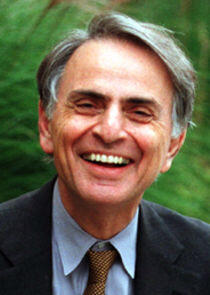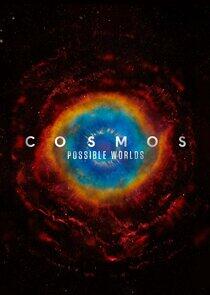
Carl Sagan
Initially an assistant professor at Harvard, Sagan later moved to Cornell University, where he spent most of his career. He published more than 600 scientific papers and articles and was author, co-author or editor of more than 20 books. He wrote many popular science books, such as The Dragons of Eden, Broca's Brain, Pale Blue Dot and The Demon-Haunted World. He also co-wrote and narrated the award-winning 1980 television series Cosmos: A Personal Voyage, which became the most widely watched series in the history of American public television: Cosmos has been seen by at least 500 million people in 60 countries. A book, also called Cosmos, was published to accompany the series. Sagan also wrote a science-fiction novel, published in 1985, called Contact, which became the basis for the 1997 film Contact. His papers, comprising 595,000 items, are archived in the Library of Congress.
Sagan was a popular public advocate of skeptical scientific inquiry and the scientific method; he pioneered the field of exobiology and promoted the search for extraterrestrial intelligence (SETI). He spent most of his career as a professor of astronomy at Cornell University, where he directed the Laboratory for Planetary Studies. Sagan and his works received numerous awards and honors, including the NASA Distinguished Public Service Medal, the National Academy of Sciences Public Welfare Medal, the Pulitzer Prize for General Nonfiction (for his book The Dragons of Eden), and (for Cosmos: A Personal Voyage) two Emmy Awards, the Peabody Award, and the Hugo Award. He married three times and had five children. After developing myelodysplasia, Sagan died of pneumonia at the age of 62 on December 20, 1996.
Biography from the Wikipedia article Carl Sagan. Licensed under CC-BY-SA. Full list of contributors on Wikipedia.
Known For
Recently Updated Shows

Common Side Effects
Common Side Effects follows former high school lab partners Marshall and Frances who begin to unravel a conspiracy involving big pharma and the federal government to suppress knowledge of a rare mushroom that may hold the key to curing all the world's diseases.

The Rehearsal
Nathan Fielder returns to television for a new series that explores the lengths one man will go to reduce the uncertainties of everyday life. With a construction crew, a legion of actors, and seemingly unlimited resources, Fielder allows ordinary people to prepare for life's biggest moments by "rehearsing" them in carefully crafted simulations of his own design. When a single misstep could shatter your entire world, why leave life to chance?

Watson
In Watson a year after the death of his friend and partner Sherlock Holmes at the hands of Moriarty, Dr. John Watson resumes his medical career as the head of a clinic dedicated to treating rare disorders. Watson's old life isn't done with him, though — Moriarty and Watson are set to write their own chapter of a story that has fascinated audiences for more than a century. Watson is a medical show with a strong investigative spine, featuring a modern version of one of history's greatest detectives as he turns his attention from solving crimes to addressing the greatest mystery of all: illness, and the ways it disrupts our lives.

The Righteous Gemstones
The Righteous Gemstones tells the story of a world-famous televangelist family with a long tradition of deviance, greed and charitable work, all in the name of the Lord Jesus Christ.

Yellowjackets
Yellowjackets follows a girls' high school soccer team. In 1975, the Dearborn High Yellowjackets became the first team in state history to qualify for the Girls' U.S. Soccer Championship Series in Manchester, NH. They never got the chance to compete. Equal parts survival epic, horror story and pitch black coming of age, Yellowjackets tells the story of the (un)lucky survivors of a plane crash deep in the Ontario wilderness, chronicling their descent from a friendly, cooperative team to warring, cannibalistic clans. At the same time, it follows the lives they've attempted to piece back together nearly twenty-five years later, proving that the past is never really past and what began out in the wilderness is far from over.
